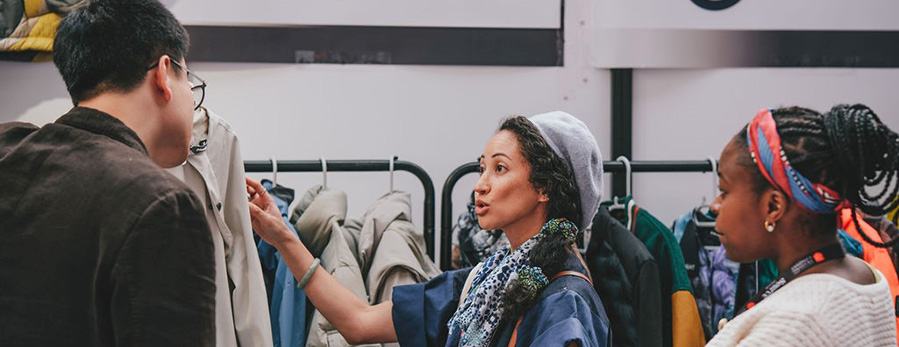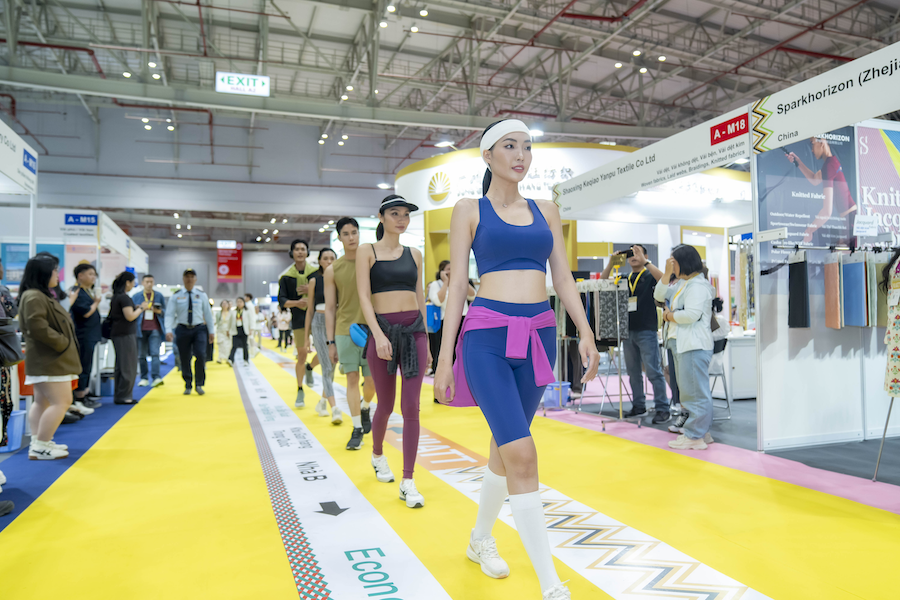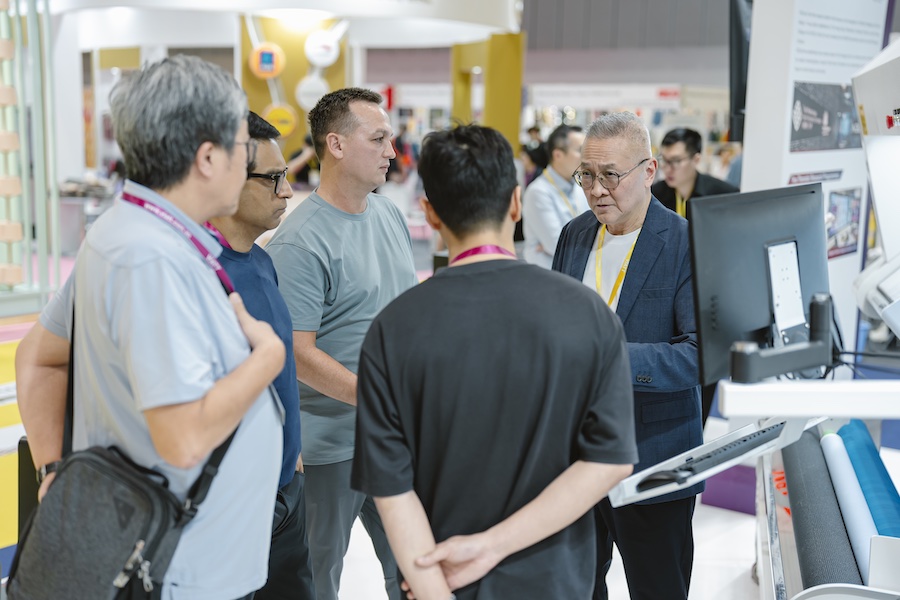#Textiles & Apparel / Garment
Source Fashion demonstrates the value and selling power of transparency

Sustainability and sourcing managers, head of product development, buyers, merchandising directors, heads of design, and garment technologists from leading brands and retailers attended today including Next, Asos, Bentley, Belstaff, Saltrock, Axel Arigato, Liberty London, Moss Bros, Lipsy, Lyle & Scott, M&S, Pour Moir, QVC, Harrods, Sweaty Betty, Boohoo, John Lewis, Tu Clothing, Urban Outfitters, and Avery Dennison.
Bianca and Natalie Farbey, from UK based exhibitor Walter Reginald said, “It is hugely important to have a show like Source Fashion in the UK, to us and the industry, and we look forward to seeing more UK suppliers and manufactures joining us.”
Exhibitor Vijay Ahuja, owner of ASU Clothing said, “This is now the third time I’ve exhibited at Source Fashion, we’ve been here from the beginning, and Source has always been good to us. We’ve had some really quality clients show up, whether it be Nobody's Child with Sir Tom Singh or Touker from Dragon's Den, we just managed to pick them up and the show turns out to be a real success every single time. We've met some really good contacts this year, and now it's up to us to work hard and make something out of it, but we've had some really big brands come by and that’s what we wanted.”
Following the morning’s catwalk presentation, Jack Stratten from Insider Trends opened the content programme with an examination on the selling power of retail transparency, presenting retailer case studies – from emerging start-ups to the oldest companies in the world - demonstrating the value storytelling brands and why consumers are engaging with deep product stories across channels. Stratten said, “Transparency is the new normal. There is a link between how transparent a brand is and how much consumers trust them. The more transparent a brand is, the more their value is elevated.” Presenting a myriad of case studies from luxury bakery Peggy Porschen in Chelsea to Californian brand Flaming Estate, he commented on how their brand power now means they’ve reached a level where they could sell anything. Community led stories such as the Rapha Cycle Club highlighted how the powerful sense of belonging and community created by some retailers are filling the community hole where social community spaces are diminishing. He continued to present retail stories built on transparency, experiences, and those that dare to be different, and closed his talk stating that “cheap isn’t a story” and we shouldn’t assume there is longevity in retailers like Temu and Shein or that their retail models are the future direction of travel.
Delving into UK Manufacturing and getting it back into the UK, Editor in Chief of The Industry Fashion, Lauretta Roberts moderated an insightful discussion on the opportunities and challenges of returning to more domestic fashion supply chains with Rosemary Moore, founder of Maxxam Textiles, and Simon Platts, CEO and Founder of Recomme who highlighted the importance of seeing the extra investment in achieving transparency as added value that enables you to create a network, engage positively with your customers, tell the stories, and create products you can be proud of.
Platts said, “There are two major issues, over production and over consumption and the UK is absolutely perfect for dealing with over production. If you want to spend your time chasing a cheap needle around the world then switch off now, if you want to understand how you can be agile, reduce your mark down, reduce your inventory, then you can understand how you can make a good margin through transparency. You are not going to be profitable if you don’t know what you are doing, you need to know your supply chain, your supplier’s supply chain, and their supplier’s chain, especially with all the new legislation coming through.”
Ian Bell, EMEA Manager at Kornitx hosted ‘Maximize margins and profitability: break free and liberate your supply chain’. He looked at unlocking the potential of your margins and profitability with Kornit's comprehensive global fulfilment network. Whether it's onshore, nearshore, or offshore, he showed how you can economically produce trend-responsive apparel without minimum order quantities (MOQs), enabling swift replenishment and substantially lowering inventory liabilities.
It is no secret that the amount of waste that goes to landfill or incineration each year is becoming an increasingly pressing issue. The cycle of overproduction, under consumption and toxic waste needs to be broken if we want to realistically recycle materials and bring them back into the supply chain. Over the past few years SATCol have been researching how to become a part of the solution, and not the problem. During the ‘Breaking the cycle - how to solve the landfill crisis’ session with SATCoL and the co-founders of Pretty Lavish, the conversation discussed developments on Fibersort technology and how to get supplies back into the supply chain and engaging senior leaders to get the buy in you need for lasting change.
Continuing the landfill waste theme the following session ‘Closing the Loop - how fashion marketplaces are contributing to the circular economy’ withCharlene Hurlock, Co-Founder, Swoperz; Joe Metcalfe, Founder, Thrift+, and moderated by Suzanne Ellingham, Director of Sourcing for Source Fashion; explored how reselling or renting second-hand clothes has the power to reduce waste and increase the lifespan of fashion products.
The inspiring session looked at how education, community, efficiency, and rediscovering the fun of fashion can help educate consumers on the implications of overconsumption, and the ways in which fashion marketplaces can help to solve consumers' barriers to the circular economy.
Hurlock, Founder of Swoperz the preloved marketplace for children, expressed how much more eco-conscious children are, with an appetite for understanding the how clothes are produced and how they can take a garment on their next adventure. “We’re creating positive habits at a young age and allowing children to take responsibility for their own wardrobe. Overconsumption in kids’ fashion is alarming and we all need to take responsibility for that.”
Metcalfe added that convenience is an important factor for both Thrift+ shoppers and the retailers working with them on Take Back schemes. But added that it isn’t just about closing the circular loop with the consumer, designers and manufacturers need to create items that are easily recyclable or resold.
Suzanne Ellingham, Director of Source Fashion said, “It’s been another fascinating, eye-opening, and inspirational day. We’ve welcomed some of the world’s most recognised brands and retailers to the show and opened up a whole new arena in responsible sourcing for them – it really highlights the need for our show. Our content programme has also delivered solid practical solutions for businesses and brilliant insights into the future of responsible fashion production and retailing.”
There’s still time to attend Source Fashion. The show is open tomorrow from 9.30am – 4pm at Olympia London visit https://www.source-fashion.com/ for more information and to pre-register.
















